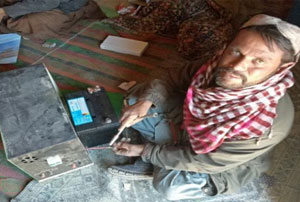Safar Khan, a 35-years-old, resident of a remote village Tirak Bolkha in district Kalat, Balochistan was afflicted with polio. Despite having a graduate degree, he found it difficult to make ends meet. After struggling long and hard to find work in a region where jobs are scarce, he found work as a night watchman at a construction site of a private house. However, his meager monthly income of PKR 6,000 meant he had to look for other earning opportunities in order to make ends meet. “During the day, I went around the streets in Kalat to find daily wage odd jobs to supplement my income,” he says.
Despite trying very hard to provide for his family, it was tough for him to get out of the vicious cycle of poverty. However, his situation took an unexpected change for the better when Society for Community Action Process (SCAP) Balochistan, with the support of the USAID Ambassador’s Fund Grant Program (AFGP), initiated a six-month solar energy project in four villages of union council Iskalkoo, Kalat.

Kalat is at a distance of 150 km from the provincial capital of Balochistan, Quetta. The provision of even the most basic of facilities becomes a challenge due to the distances between villages of the area.
Under the program titled “Improving Living Standards of Underprivileged Population through Installation of Home-Based Solar Energy Systems in 65 Off-grid Households”, SCAP installed solar panel systems in 65 households of the area. They also trained five local youth as solar technicians through a 20-day course. On completion, the trainees were given certificates and tool kits comprising of the necessary equipment for maintaining the solar systems.
One of these successful technicians was Safar, who then became a volunteer with a vendor contracted by SCAP to install home-based solar powered systems. Safar Khan fixes the charge controller and battery in the solar system casing (AFGP Photo) 2019 Even while volunteering, Khan won two contracts for installation of the solar panels at a local market – each contract worth PKR 15,000. He now also has a chance of landing a new job that could earn him PKR 30,000 every month – a significant improvement compared to his situation a little while ago.
Today, Safar is brimming with confidence and believes this field has great potential. “So many unemployed youth of the area now have the opportunity to earn a minimum of PKR 20,000 per month if trained as solar technicians considering the increasing trend of solar system installations in district Kalat,” he says.
“So many unemployed youth of the area now have the opportunity to earn a minimum of PKR 20,000 per month if trained as solar technicians considering the increasing trend of solar system installations in district Kalat,”
Safar Khan
Kalat, Balochistan
The villagers are delighted that they now have lights and fans. Abdullah, who got solar-powered system installed at his house, says he is indebted to the people who provided this marvelous facility. “Previously, we used to burn lamps, which caused various chest and lungs related problems among us. Also, the oil used for lighting had become expensive.”
The solar-powered systems have not only provided the youth of the area with a significant income source, but it has also illuminated the village and the lives of its residents. The village women can now do embroidery and other work until late in the evening while children, who could only complete their homework during daytime previously, can now do their homework at night as well. Light has indeed brightened numerous futures.














